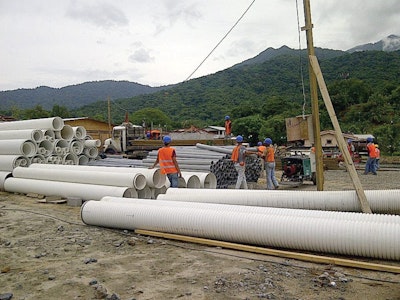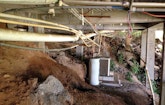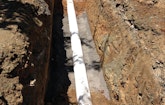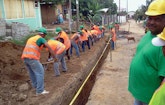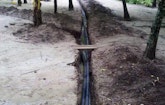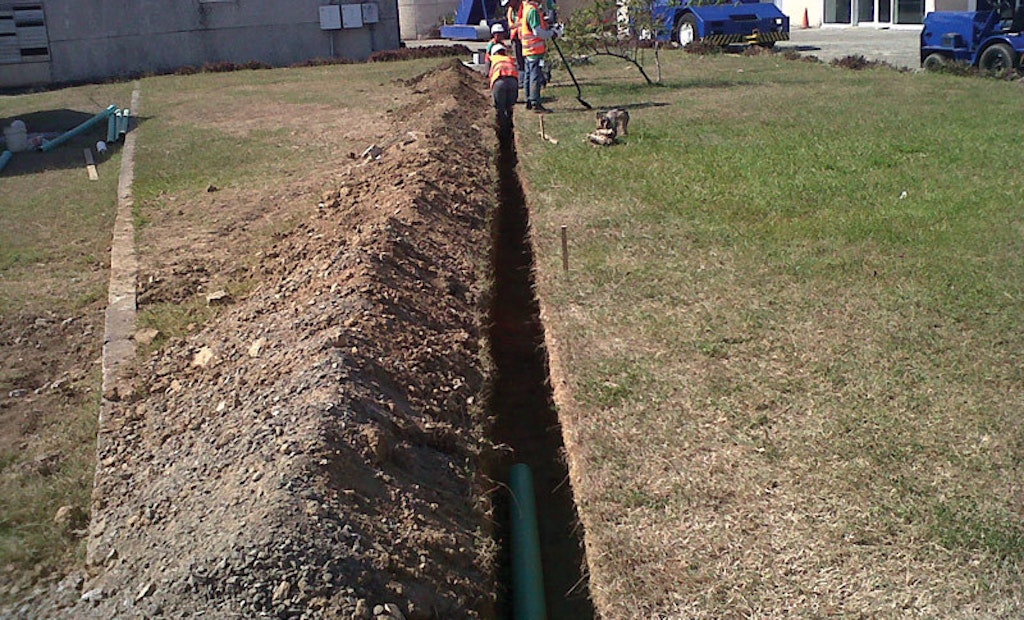
Interested in Plumbing?
Get Plumbing articles, news and videos right in your inbox! Sign up now.
Plumbing + Get AlertsDan Taylor doesn’t have an operation like yours. It is more challenging in many regards, due in large part to the place where he does business. But those challenges also yield great rewards.
Taylor has made a home and a business on Roatan, part of the tropical Bay Islands that lie 40 miles from the north coast of Honduras in the Caribbean Sea. He and his wife, Sam, settled there about 12 years ago after he had spent a civil engineering career mostly in northeastern Africa and the Persian Gulf. They wanted a warm and green place to retire. They bought land to develop with condos and houses, their own home among them. Their development at
Keyhole Bay is moving along, but their house hasn’t been built yet because Taylor had to build a new company first.
Roatan is very Third World in terms of educational attainment. When Taylor looked for engineering services to begin the development at Keyhole Bay, he couldn’t find them on the island. So he started his own company to do the work. At each step of the development process he had the same problem and solved it by starting a new company or expanding his company’s services. As a result, he now has a multifaceted company with 23 key employees who do a bit of everything, from pumping tanks to installation and cleaning.
It’s all plastic
Cleaners in North America are used to finding almost anything in the ground. Acme isn’t. “We have many different things, but in no case is it the crumbling clay, concrete or the pot metal or the steel we see in our North American communities,” Taylor says.
What Roatan has is plastic. It could be ABS, PVC or in some cases HDPE. None of it is old.
“Our biggest problems are from failing joints on the repair side. The second biggest problem is inept installation. We don’t have an enforced plumbing code,” Taylor says.
The lack of codes is both a problem and a benefit for people on Roatan. The absence of a code is a boon to responsible operators such as Acme because it can use the smartest and least expensive solution without struggling against rules 30 years out of date. But problems come from pipe installers who don’t know what they’re doing and have no rules for guidance.
For example, Taylor says, any knowledgeable person would install a sanitary T junction so the curves inside the pipe smoothly add liquid to the flow passing through. On Roatan, workers are equally likely to install the junction backwards so the flow through the curved sections is against the flow going through.
“Now you have a tremendous opportunity for clogs and problems. We just had a job that took much of one night where we completely replumbed the wastewater collection system for 12 condo units while the occupants slept. They had been put together incorrectly,” Taylor says. Clean-outs were in the wrong place or pointing in the wrong direction. “The pipes had been suspended with coat hangers every 12 to 14 feet and sagged in between the hangers. To make it more interesting, they had used the wrong pipe.”
It starts with systems
In part, the problems with Roatan’s pipes are a result of how the system grew. On Roatan, systems often begin with one person or a few people. Because supplies and shipping are expensive, people install only the amount of pipe needed for the moment, and systems are extended as needed.
Because it lacks adequate supply, the municipal water system in most Roatan communities is split into zones. Each zone receives water only two or three days per week. As a result, users store water in barrels and tubs in their homes for use on days when their pipes aren’t pressurized. Without constant pressure in the pipes, contaminants can leak in.
“What you’re delivering to the house is not potable water but rather ‘wet’ water. You can use it for bathing and washing, but you can’t drink it. You buy your 5-gallon bottled water for that,” Taylor says.
Acme goes to work on days when pipes pressurize and a leak shows, but problems don’t result from the collapsing systems that plague parts of North America. Instead of laying new pipe on a bed of sand and then filling space around the pipe with finely sifted and compacted soil, some workers on the island dig a trench, drop in a pipe and backfill with the soil they took out. The soil is compacted by surface use. In addition to bending stresses, rocks are often pushed against the pipes, creating other potential problems.
The water system for the cruise port in the capital city of Coxen Hole is another example of how resources affect work on the island. The water supply for the port begins in a 10,000-gallon tank about half a mile inland and 700 feet up the steep coral hills that form the island’s backbone. A 5 hp pump helps the water move through the 4-inch line from the tank to the port facility. Acme had a request to solve a water supply problem because there wasn’t enough water pressure in the port to serve the second floor of a two-story building.
“There should be so much head pressure from gravity alone that there would be no need for a pump,” Taylor says. “What they didn’t allow for was the friction from 47 changes of direction that occurred during installation as the installers changed the course of the water line to go around the many small pieces of property between the tank on the hill and the port buildings 700 feet below. Imagine 47 90-degree elbows.”
To save money, the people who built the system also changed from 4-inch pipe to 1-inch for much of the run. Acme’s solution was to put in a single large pipe, eliminate the pump, and straighten out the run, installing 45- or 22.5-degree bends instead of the 90s when turns couldn’t be avoided. Supply and pressure at the port are now more than adequate.
The largest pipe used for supply lines on the island is 4-inch, and there’s not much of that. Most is 2-inch or smaller, Taylor says.
Getting stuff is the challenge
Cost is a real factor in accomplishing anything on Roatan. Everything that comes in has to come by boat or plane, and it’s expensive either way. When Taylor orders supplies he tries to do it by the shipping container when possible, and he takes pains to fill every corner of a container so he moves as little empty space as possible. It can take three to four weeks to get equipment and supplies delivered by sea. That means he has to carry a much larger inventory than he would if he had a supply house nearby.
Once on the island, goods are still his responsibility because there is no delivery service. There are only a couple large cranes, and they’re at the docks to unload ships. Workers have to fetch everything from the port, and supplies must fit in one of Acme’s Isuzu trucks, the 3.5-ton or the 6-ton, or in the half-ton Nissan pickup. And everything must be small enough and light enough to be handled by humans because there are few machines on Roatan. If it gets done here, it is done primarily with human muscle.
“We have a couple of large lift station pumps that we need a backhoe to lift but for the most part we put four to eight men on the working end of a rope or strap,” Taylor says.
PVC is the pipe material of choice because it’s relatively inexpensive. Companies in Latin America produce it, so the cost is more affordable than material sourced from North America. On the other hand, it’s easy to steal water from someone’s pipe by installing a saddle valve under cover of darkness, and that does happen, Taylor says. Using HDPE eliminates water theft, but it’s harder for customers to employ because they cannot work with it themselves. There is only one machine and one operator on the island to weld the HDPE joints. The only users who opt for using HDPE are developers of well-planned resorts.
Bright future
Acme clears drains with a Spartan cable machine. It’s the only one on the island, and as a result Spartan has become a common name for a cable machine, like Kleenex for tissue. When Roatan residents need a pipe cleaned, they want Acme to bring a Spartan.
Acme looked at several camera systems at the Pumper & Cleaner Environmental Expo last year and again turned to Spartan. It has an iPad monitor and cables to fit the small residential systems as well as the larger wastewater collection systems.
While at the show, Taylor and his senior operating engineer, Samuel Rivera, also looked at a wide variety of cure-in-place pipe lining systems and decided to go with a system from Source One Environmental. Taylor picked Source One because their equipment is simple enough that Rivera can teach it to people who have never seen the technology, and because it is small enough to fit in one of the company’s pickups. The system will give Acme an advantage because it will eliminate the need to dig up roads. Like the Spartan cable machine and camera system, the cure-in-place equipment will be the first on the island. That means acceptance and use will come slowly. “The equipment won’t pay for itself at first. I have to get it first and build the demand for it,” Taylor says.
Coming right after the cure-in-place equipment will be pipe bursting gear. It will be especially useful where systems have been damaged due to poor installation or in places where the local installers downsized pipe diameters to save money or where a small pipe is now undersized because of system expansion, Taylor says.
There are challenges with working in a developing country, but those challenges are far outstripped by the rewards. They are evident in Taylor’s enthusiasm as he explains the challenges his people faced and the solutions they applied.
The other reward is the opportunity to have a lasting effect. Taylor has been able to build something good completely from scratch and help the people around him expand their skills. More than that, Acme has had a real effect on the local government, which in many cases has adopted the company’s practices as the standard against which similar work is measured. As Honduras and Roatan develop, they may wind up ahead of their problems because of the help they have had from a First World engineer who just wanted a pleasant place to retire.
More Information
Spartan Tool, LLC - 800/435-3866 - www.spartantool.com
Source 1 Environmental - 810/412-4740 - www.s1eonline.com
